Exploring the Depths of Neon Genesis Evangelion Manga
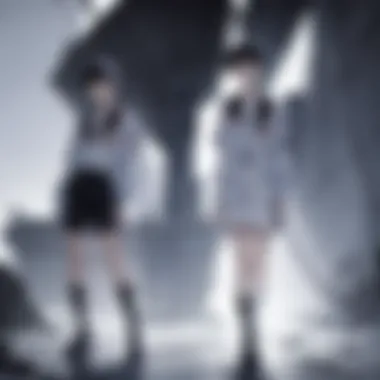
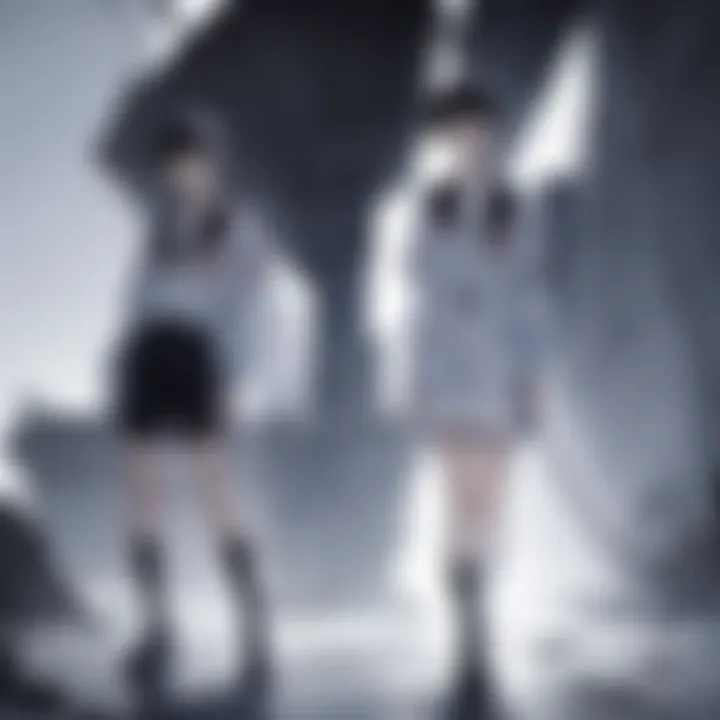
Intro
Neon Genesis Evangelion is not just a manga; it is a cultural phenomenon. This manga, created by Yoshiyuki Sadamoto, brings a unique blend of deep narrative complexity and compelling character arcs. Examining it reveals a rich tapestry of themes that resonate with audiences. From its portrayal of existential struggles to the exploration of human relationships, the manga holds significant relevance in the larger Evangelion franchise. To understand its impact, one must analyze its content, narrative structures, and cultural contributions.
The upcoming sections will comprehensively cover various aspects of the manga. We will begin with episode reviews, providing a summary and detailed analysis of key events within the story. Next, character spotlights will shed light on the personalities that drive the narrative. Following that, a comparison between the anime and manga will highlight significant differences and similarities. Additionally, we will explore recent industry news and updates relevant to the franchise. Finally, we will present top 10 lists that showcase fan favorites and significant moments.
Each section aims to enhance your understanding of Neon Genesis Evangelion, regardless if you are a seasoned fan or new to the series. By dissecting these components, you can appreciate the manga's depth and its lasting impact on anime and manga discourse.
Prelims to Neon Genesis Evangelion
The realm of anime and manga often engages with themes that resonate deeply with society and philosophy. One of the most pivotal fixtures in this landscape is Neon Genesis Evangelion. This series is not just a collection of illustrations and dialogues but a profound cultural artifact that has challenged conventions in storytelling. In this article, we will unravel its complexities, focusing on its innovative narrative, character arcs, and themes that evoke robust discussion among fans and scholars alike.
Overview of the series
Neon Genesis Evangelion began its run as a manga in 1995, created by Yoshiyuki Sadamoto. It is set in a post-apocalyptic world. The story delves into the lives of teenagers who pilot giant mechs known as Evangelions to protect humanity from mysterious beings called Angels. The manga differs from the anime in several narrative aspects, offering a more intimate perspective on its characters.
The series has gained critical acclaim for how it explores not only the physical battles but also the psychological struggles of its characters. Each character embodies distinct attributes, revealing their fears, desires, and motivations as the story progresses.
The artwork itself is notable for its blend of stark realism and emotional expression. There is a uniqueness in how the visuals and narrative intertwine to create a sense of urgency and depth, encouraging the reader to engage on multiple levels.
Significance in anime culture
The significance of Neon Genesis Evangelion in anime culture cannot be overstated. It redefined genres and shifted the expectations of what anime could achieve. Unlike many of its predecessors that focused purely on action and adventure, Evangelion introspects on existential themes.
This series has influenced countless works in anime, setting a precedent for narratives that explore psychological and philosophical dimensions. It challenged the conventional archetypes of heroism and the idea of the protagonist, representing a departure from traditional storytelling methods in the medium.
Many fans regard it as a cornerstone of anime and manga, which has been discussed extensively in literary circles. The lasting impact of Evangelion is observable in various media, showcasing its relevance across generations. The depth of its themes continues to resonate, prompting readers and viewers to reflect on their own lives.
"Neon Genesis Evangelion did not just create a genre; it reshaped the perceptions of anime as a whole."
The dualistic nature of enjoyment and contemplation that this series evokes adds layers to the viewer experience, making it essential for both new audiences and those revisiting the narrative. The ongoing dialogue about its themes ensures that Neon Genesis Evangelion remains a topic of interest and relevance in anime culture.
Origins of the Manga
The origins of the Neon Genesis Evangelion manga provide crucial context for understanding its significance in the broader landscape of anime and manga. By examining the factors that contributed to its creation and development, one can appreciate the unique conditions that shaped this influential work. This section will cover the creation and publication history, as well as the various influences that have impacted its development.
Creation and publication history
Neon Genesis Evangelion was first published in 1994, in the monthly magazine Shōnen Ace. Created by Yoshiyuki Sadamoto, the manga is a companion piece to the anime series directed by Hideaki Anno. The manga diverged somewhat from the anime in terms of plot and character development, offering readers an alternative yet complementary experience.
The initial chapters set the stage for a dystopian world marred by conflict and existential questions. Sadamoto's artwork caught the viewer’s attention, bringing to life bleak landscapes, complex machinery, and emotionally charged characters. The plot advanced in stages, reflecting not just the narrative progression but also the evolving relationship between the protagonist, Shinji Ikari, and other central figures.
As the manga gained traction, it helped to solidify Neon Genesis Evangelion as a fundamental component of modern manga discourse. It concluded in 2014, with a total of 14 volumes, each presenting intricate details about characters' thoughts and motivations, leading to a deeper exploration of psychological themes.
Influences on its development
The development of Neon Genesis Evangelion was influenced by various factors that helped craft its unique narrative style and visual identity. First, aspects of Japanese culture, including the post-war societal context, a growing fascination with mecha technology, and traditional storytelling methods played an important role.
Some significant influences include:
- Psychological Theory: Freudian concepts and Jungian archetypes resonate throughout the story, shaping the characters’ psychological depths and emotional struggles.
- Religion and Mythology: Evangelion incorporates elements from various religious traditions, particularly Christianity, which adds layers of symbolism and interpretation.
- Film and Literature: Influences from Western cinema and literature, such as the works of David Lynch and philosophical texts, permeate Sadamoto’s storytelling approach.
This mélange of influences not only enhances the depth of the narrative but also sets Neon Genesis Evangelion apart from other manga of its time. > "It is a narrative that continuously invites viewers and readers to question their perceptions of reality, existence, and identity."
In summary, the origins of the Neon Genesis Evangelion manga are marked by a rich tapestry of cultural, psychological, and artistic influences. A deeper understanding of these elements helps to elucidate the overall impact of the work and its place in contemporary manga and anime.
Narrative Structure and Style


The narrative structure and style of the Neon Genesis Evangelion manga play a crucial role in shaping its impact and resonance with audiences. This aspect is not merely a backdrop but an active element that engages readers through complex themes and multifaceted character arcs. Understanding this structure allows one to appreciate how the manga conveys its rich storytelling and philosophical inquiries.
Multi-layered storytelling
Neon Genesis Evangelion employs a multi-layered storytelling approach that intertwines various narrative threads and perspectives. This complexity invites readers into a world where surface actions often hide deeper meanings. The narrative oscillates between action-packed scenes of battling the Angels and introspective moments that delve into the psyche of its characters.
The text often shifts focus, exploring individual characters' struggles, fears, and desires. For instance, Shinji Ikari's journey reveals his internal conflicts, examining themes like abandonment and the search for validation. As readers navigate through these layers, they encounter a multiplicity of emotions and experiences that enrich their understanding of the characters and their contexts.
Moreover, the manga’s structure encourages a nonlinear exploration of events. Flashbacks, dreams, and fragmented memories contribute to a sense of urgency and existential dread. This approach compels the audience to engage actively with the content, piecing together the fractured narrative while reflecting on its broader implications. In essence, each layer contributes to a tapestry that deepens the reading experience and provokes thoughtful discourse.
Pacing and narrative devices
Pacing in Neon Genesis Evangelion is both deliberate and varied, skillfully balancing moments of high tension with quiet reflection. The manga does not adhere to conventional pacing; rather, it employs techniques that create tension and release at strategic intervals. Action scenes are intense and visually stimulating, captivating readers’ attention while pushing the plot forward. However, these are often followed by slower, contemplative segments that allow for character development and thematic exploration.
Narrative devices such as symbolism and foreshadowing are utilized effectively throughout the manga. For instance, the recurring imagery of the giant mechs and Angels often stands as a metaphor for the characters’ inner battles. Additionally, foreshadowing subtly hints at future events, suggesting an inevitable convergence of personal and external conflicts. This intricate pacing and thoughtful use of narrative devices invite readers to reflect on the events as they unfold, encouraging a deeper level of engagement with the story.
Readers may experience a sense of disorientation at times, mirroring Shinji's own feelings of alienation. This is intentional; the pacing and narrative style reflect the emotional turbulence of the characters’ journeys. Overall, the narrative structure and style of Neon Genesis Evangelion not only serve to tell a story but also to communicate complex themes, illustrating the intersection of personal narrative and existential philosophy.
Character Development
Character development is a core element in Neon Genesis Evangelion manga. It shapes the reader's understanding of the narrative and adds depth to the broader themes of the work. Each character serves not just as a plot device but as a representation of various psychological and existential concepts. The exploration of their inner worlds makes the manga resonate deeply with audiences, making it crucial to analyze how these characters evolve throughout the story.
Main protagonists
The main protagonists of Neon Genesis Evangelion are Shinji Ikari, Rei Ayanami, and Asuka Langley Soryu. Each character embodies unique traits and struggles, contributing to the narrative's emotional weight.
Shinji Ikari is perhaps the most compelling character. His journey throughout the manga is marked by profound insecurity and a quest for acceptance. As a pilot of Evangelion Unit-01, he grapples with his feelings of inadequacy and the pressure imposed by others. Readers often connect with his vulnerability, making him a relatable figure.
Rei Ayanami is another main protagonist. She represents the themes of identity and what it means to exist. Initially, her character appears cold and distant, but as the story unfolds, layers of complexity are revealed. Rei questions her own humanity and purpose, which resonates in discussions about individuality and emotional isolation.
Lastly, Asuka Langley Soryu offers a contrasting dynamic. Her brash and confident exterior often hides deep-seated insecurities and trauma. Asuka's character development highlights themes of competition and the need for validation. Her interactions with other main characters showcase the fragility of human emotions and the coping mechanisms people adopt.
Supporting characters and their arcs
Supporting characters enrich the story's narrative tapestry and contribute to the protagonists' development. Figures such as Misato Katsuragi and Gendo Ikari serve vital roles, shaping the outlook of Shinji, Rei, and Asuka.
Misato Katsuragi acts as Shinji's guardian and mentor. Her character balances professionalism with personal flaws, making her relatable yet complex. Misato represents a path of adulthood filled with choices that impact her relationships and career. Her struggles highlight the theme of human fallibility.
Gendo Ikari, on the other hand, represents authority and the burden of expectations. As Shinji's estranged father, Gendo's complex motivations drive much tension in the story. He embodies issues of parental responsibility and the consequences of emotional neglect, influencing Shinji's own development significantly. This dynamic speaks to themes of familial relationships and the cycle of emotional trauma.
Character relationships and dynamics
The interpersonal relationships in Neon Genesis Evangelion are vital to understanding character development. The complexity of these connections mirrors the intricacies of human emotions.
The relationship between Shinji and Asuka is particularly insightful. It illustrates how dependency and rivalry can coexist. Their interactions vary from camaraderie to conflict, reflecting the undecided feelings they harbor for each other. This volatile dynamic serves as a vehicle for exploring themes of love, fear, and vulnerability.
Similarly, Shinji’s bond with Rei is pivotal in shaping his understanding of connection and identity. Rei's existential questions challenge Shinji to confront his own feelings about self-worth and the nature of human bonds.
Misato's relationship with both Shinji and Asuka also serves to highlight the theme of mentorship and familial roles, expanding the emotional landscape of the narrative. Through these intricate relationships, readers gain a comprehensive understanding of each character's journey and the broader implications of human connection.
The strength of Neon Genesis Evangelion lies in its ability to explore not just individual struggles, but the complexities of relationships that define human experience.
Themes and Symbolism
The themes and symbolism in Neon Genesis Evangelion play a crucial role in shaping its narrative and emotional depth. This section explores the complex subjects that underpin the manga. Understanding these themes adds layers to the reader's experience, enriching the appreciation of its characters and storyline. It also reflects the societal issues that resonate even in contemporary discourse.
Existentialism and psychology
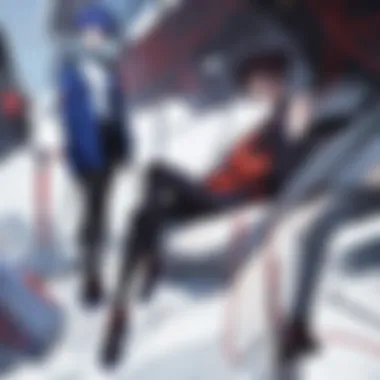
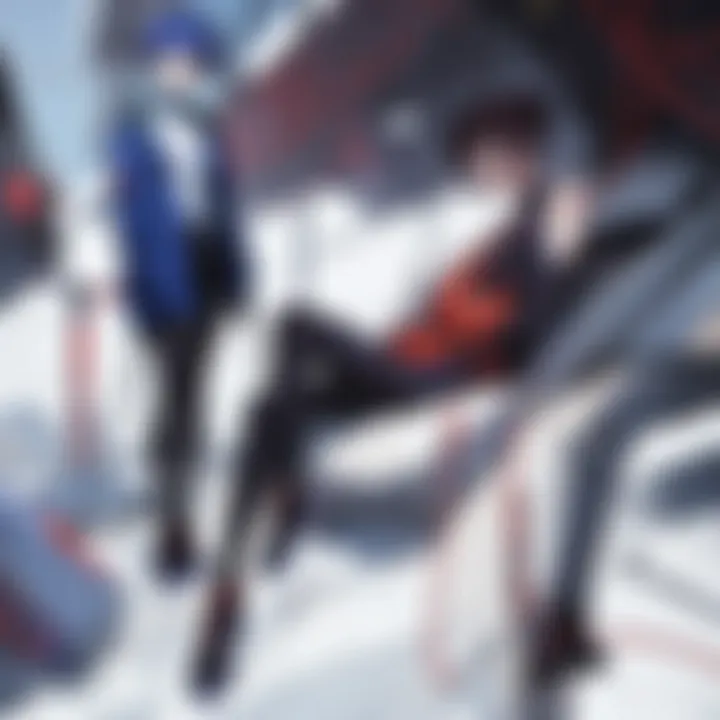
Neon Genesis Evangelion is steeped in existentialist philosophy, which interrogates the essence of human existence and the individual's place in the universe. The characters face profound crises related to identity and purpose. For example, Shinji Ikari, the protagonist, frequently grapples with feelings of worthlessness and self-doubt. This internal conflict is reflective of existential thinkings, where the search for meaning is central.
The psychological theories explored in the series range from Freud's notions of the unconscious to Jung's concept of the collective unconscious. These theories appear in character interactions and their struggles. The psychological backdrop offers a rich exploration of the mind and how it relates to external influences. In turn, this becomes a vehicle for viewers to examine their own psyches and the nature of their realities.
Identity and the self
Identity is a recurring theme that intertwines with character development throughout the manga. Many characters, including Rei Ayanami and Asuka Langley Soryu, frequently reflect on their pasts and confront their identities. Neon Genesis Evangelion presents identity not as a fixed construct, but rather as a fluid and evolving concept.
Rei, a clone created for a specific purpose, questions her humanity while navigating her relationships with others. Asuka struggles with insecurities stemming from her childhood, which manifest in her competitive nature. These character arcs lead to poignant revelations about the struggle of accepting one’s self. The symbolism of the Eva units themselves serves as a parallel to each character's struggle for identity, making the series not just a tale of survival but a deeper exploration of the self.
Human connections and isolation
Another significant theme in the manga is the juxtaposition of human connection and isolation. Characters frequently oscillate between yearning for connection and retreating into themselves. The events in Neon Genesis Evangelion highlight the difficulty in forming genuine bonds amid personal and collective trauma.
The necessity of communication and mutual support is essential for the characters as they face the immense pressures from their battles. Yet, many characters experience profound isolation. For instance, Shinji's detachment from his peers and even from himself underscores a painful reality many face in their lives. The relationships formed throughout the manga, while pivotal, often fall prey to misunderstandings and emotional barriers.
"The art of living is not to be in the world, but to feel that you belong to it, to feel another in your proximity." This quote encapsulates the struggle presented in Neon Genesis Evangelion.
The duality of connection and isolation enriches the narrative and serves as a commentary on the human condition, making the themes relevant even to audiences today. Each character embodies the struggle to overcome isolation in pursuit of meaningful relationships, pressing the reader to reflect on their own experiences of connection in a complex world.
Art and Visual Style
In the exploration of the Neon Genesis Evangelion manga, the significance of art and visual style cannot be understated. These elements not only enhance the storytelling but also contribute to the overall atmosphere and emotional weight of the narrative. Each panel, meticulously designed, demands attention as it reflects the complex themes and emotions encountered by the characters. The use of specific art techniques illustrates psychological states and existential dilemmas, making visual representation a core part of the narrative experience.
Artistic influences
The influence of various artistic movements can be seen throughout Neon Genesis Evangelion. Yoshiyuki Sadamoto, the manga's artist, draws inspiration from both Western and Eastern art styles. The clean lines and detailed backgrounds often harken back to classic comic style, while the emotionally charged character designs tap into the emotive quality of manga art. This fusion enhances the depth of the story, allowing readers to connect with characters on a visceral level.
Moreover, Sadamoto incorporates subtle nods to various genres, including horror and surrealism. The character Shinji Ikari, for instance, often appears in distorted realities, which mirrors his inner turmoil. These artistic choices heighten the tension and reflect the series’ exploration of mental conflict and identity crises.
Visual symbolism
Visual symbolism is pivotal in Neon Genesis Evangelion, enriching the narrative's thematic complexity. Various symbols recur throughout the manga, providing layers of meaning that may not be immediately apparent to all readers. The mechs, specifically the Evangelions, symbolize humanity's struggle against its own limitations, as well as the fear of self-destruction.
Furthermore, color plays a significant role in conveying mood. For example, darker tones often accompany scenes of despair and conflict, while brighter colors may imply hope or connection. This intentional use of color supports character arcs and helps convey emotional shifts.
Aspects like the recurring cross symbol and references to religious iconography add another level of depth. While some may interpret these symbols straightforwardly, others may find layers of meaning associated with broader cultural references, highlighting the manga's complexity.
The importance of art and visual style in Neon Genesis Evangelion illustrates the series' profound engagement with themes of identity, existentialism, and the human psyche.
By deeply analyzing these artistic components, fans and newcomers can gain a richer understanding of the intricate narrative that has defined Neon Genesis Evangelion in both manga and anime culture.
Reception and Impact
The reception and impact of the Neon Genesis Evangelion manga are crucial to understanding its place in the anime and manga landscape. This section sheds light on how the manga was perceived by critics and audiences alike at the time of its release. It also examines its enduring legacy in shaping future works and its cultural significance.
Critical response upon release
Upon its release, Neon Genesis Evangelion received mixed to positive reviews. Critics pointed out its complex narrative and character depth, but some found it challenging. This led to diverse reactions. Notably, many praised the exploration of psychological themes, few criticized its pacing and dense dialogue, which required careful attention. The Tokyo Pop English publication captured a wider audience, showing that interest in such narratives had grown.
A notable aspect of the response was its impact on the genre of mecha. Critics recognized the series as a departure from traditional giant robot stories. Instead of action and adventure, Evangelion focused on personal struggles and existential dilemmas. This innovative approach resonated with audiences, pushing boundaries of what could be expected from a manga of its kind.
"It is less about the machines and more about the minds of the pilots, making you question what you know about humanity."
Legacy in manga and anime
The legacy of Neon Genesis Evangelion in both manga and anime is profound. Its influence can be seen across various works that emerged in the years following its release. Many creators have cited Evangelion as an inspiration, shaping narrative structures and character development in their own projects.
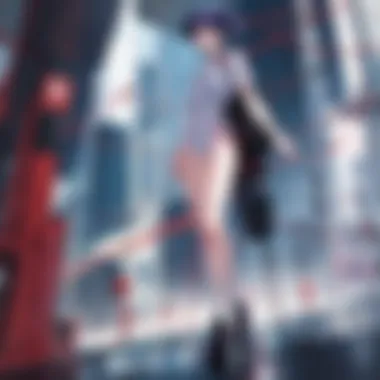
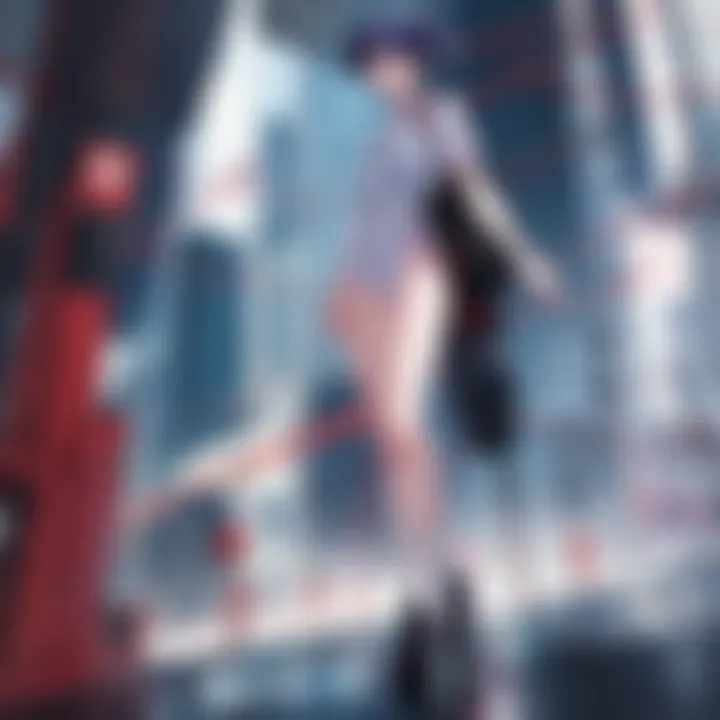
- Impact on storytelling: Evangelion popularized multi-layered storytelling in anime. Many series began to experiment with complex characters and themes, leading to deeper narratives.
- Character complexity: The detailed exploration of character psyches paved the way for depth in character arcs in later series. Works such as Serial Experiments Lain and Rebuild of Evangelion reflect that influence.
- Cultural references: Elements from Evangelion often appear in popular media, from parodies to direct homages, highlighting its significance.
In summary, both the initial reactions and the lingering legacy of Neon Genesis Evangelion have made it a cornerstone of manga and anime culture, affecting how stories are told and perceived in the years that followed.
Adaptations and Spin-offs
The adaptations and spin-offs of Neon Genesis Evangelion expand upon the original manga, deepening its narrative potential and enhancing its influence on both the anime and manga landscapes. These adaptations are not merely extensions; they serve to reinterpret the complex themes, characters, and story arcs of the source material. By examining these adaptations, one can appreciate how they contribute to the overall legacy of Evangelion.
Anime adaptations compared to the manga
The Neon Genesis Evangelion anime adaptation, directed by Hideaki Anno, made its debut in 1995 and quickly became a landmark series. While the manga began publication around the same time, the anime presents distinct interpretations of the same characters and themes.
- Storytelling Approach: The anime uses a different narrative technique compared to the manga. It emphasizes visual storytelling and acute emotional presentations, which at times overshadow subtle character development present in the manga.
- Character Development: Characters like Shinji Ikari and Rei Ayanami differ in depth between the two mediums. The anime explores psychological nuances through visual and auditory elements, while the manga allows for more direct internal monologues and reflections.
- Ending and Themes: The endings of both versions diverge significantly. The anime's ending introduces an abstract conclusion that plays with themes of reality and self-perception, while the manga opts for a more traditional resolution.
This contrast raises critical discussions about Evangelion's thematic intentions and the representation of mental states. Both adaptations complement each other, presenting fans with varied insights into the universe.
Manga spin-offs and narratives
Spin-offs of the Neon Genesis Evangelion manga expand the universe in intriguing ways, offering fans additional contexts and stories. One notable spin-off is Neon Genesis Evangelion: Angelic Days, which portrays the series through a more lighthearted and optimistic lens. Here are some key aspects of these narratives:
- Expansion of Lore: Spin-offs often delve into character backstories. For instance, stories focusing on lesser-known characters can enrich the main narrative's complexity.
- Genre Exploration: Different spin-offs experiment with genre conventions, including romantic comedies and action-focused narratives. This diversity allows new fans to engage with the franchise in various ways.
- Canonical vs. Non-canonical: While some spin-offs attempt to stay true to the original lore, others diverge, creating alternate universes. This flexibility enables a broad spectrum of storytelling possibilities.
"The richness of the Evangelion universe is reflected in its spin-offs, which present alternative trajectories and character developments not found in the original series."
In summary, adaptations and spin-offs of Neon Genesis Evangelion are crucial in understanding its cultural impact. They demonstrate how a single narrative can evolve through different avenues, allowing for both continuity and innovation.
Influence on Contemporary Works
The influence of Neon Genesis Evangelion on contemporary manga and anime is profound and multifaceted. This section explores how the series has shaped narratives, character archetypes, and thematic explorations in the medium. It highlights key elements that contribute to its lasting impact and considers its significance within the broader realm of pop culture.
Impact on subsequent manga and anime
Neon Genesis Evangelion served as a turning point for many subsequent works. Its intricate storytelling and character depth set a new standard for what audiences could expect. Other manga and anime, influenced by Evangelion, often embrace psychological and existential themes that examine the human condition.
Notable series like Serial Experiments Lain and Paranoia Agent have drawn from Evangelion’s exploration of identity and reality. These works often incorporate similar narrative devices, such as nonlinear storytelling and ambiguous endings, leaving viewers to grapple with their interpretations. Additionally, character designs and relationships seen in Evangelion influenced popular titles like Attack on Titan and My Hero Academia. This blending of genres, taking shame, guilt, and anxiety as focal points, has become more common in contemporary narratives.
Cultural references in popular media
The cultural footprint of Neon Genesis Evangelion extends far beyond the realm of anime. Its themes have infiltrated various forms of media, including film, literature, and art. Movies such as The Matrix reference elements of Evangelion’s narrative, particularly its philosophical inquiries and dystopian settings.
Moreover, Evangelion's impact is apparent in music, with numerous artists and bands citing it as an inspiration. Iconic visual motifs, such as the mechs and the intricacy of human emotions, are woven into contemporary creativity, reflecting its wide-reaching influence.
Furthermore, Evangelion has shaped discussions on mental health, with its characters often facing inner turmoil, resonating with audiences on an emotional level. Such an approach encourages representation of psychological struggles in modern narratives, aiding in the normalization of these discussions in society.
"Evangelion redefined the boundaries of anime storytelling, making it not just entertainment, but a vehicle for deep philosophical dialogue."
Through these impacts, Neon Genesis Evangelion not only transformed its immediate successors but also created a legacy that continues to inspire new generations of creators and thinkers, embedding itself in the cultural lexicon of the modern era.
Finale
The conclusion of this article serves as a critical point to reflect on the multifaceted nature of the Neon Genesis Evangelion manga and its profound implications in both the anime and manga landscapes. This section synthesizes the preceding discussions while highlighting the relevance and lasting impact of the narratives explored throughout.
Summary of key points
In summary, the Neon Genesis Evangelion manga is celebrated for its intricate layering of themes and character dynamics. Key points from the exploration include:
- Narrative Complexity: The story's multilayered structure combines elements of psychological thriller, mecha genre, and philosophical inquiry.
- Character Depth: Protagonists such as Shinji Ikari and Rei Ayanami undergo significant development, embodying the struggles of identity and acceptance.
- Themes: Existencialism, human connections, and the nature of self are woven intricately into the plot, challenging readers to engage with the material on a deeper level.
- Cultural Impact: Neon Genesis Evangelion has influenced countless creators in the domain of manga and anime, prompting dialogues about its meaning and implications.
- Reception: The varied responses from critics and audiences reveal the unique position this work holds within the narrative discourse of Japanese visual storytelling.
Future of the Evangelion franchise
Looking ahead, the future of the Evangelion franchise appears robust. As new adaptations and reinterpretations emerge, including potential sequels or spin-offs, the franchise will likely continue to reinvent and expand its universe. With rising interest in classic anime, future generations may rediscover the manga and its profound themes.
Even as the original series retains its iconic status, it also serves as a foundation for new creators to draw inspiration from. Its influence is seen not just within its genre but across the broader scope of popular culture, ensuring its relevance in discussions about identity, connection, and the human experience. This ever-evolving discourse promises that Neon Genesis Evangelion will remain an intriguing subject long into the future.







